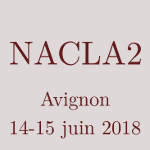|
News Study Day on 15th June. Programme and abstracts available for download here! Call for papers Corpora and performance texts. 14-15 June 2018. The aim of the conference NACLA2 is to explore the relevance of a corpus based approach to performance texts. The performance text includes classical drama – plays, scenarios, film scripts, etc. – but potentially also texts relating to other dramatic modes, in the largest sense, including parliamentary debate, minutes of meetings, interviews, etc. all of which involve some aspect of performance. If there are now TEI criteria for the xml labelling of theatrical texts, there are as yet no such norms for the daily dramaturgy of debates, etc. (http://www.tei-c.org/release/doc/tei-p5-doc/en/html/DR.html) a point which has led some researchers to take inspiration from standards for the theatrical text in the structuration of other similarly heterogeneous text types (cf. the PolMine initiative https://polmine.github.io/about/). The xml tags of TEI are in addition not always the most relevant, depending on the type of data and the tasks envisaged (Hardie 2014, "Modest XML for Corpora : Not a standard, but a suggestion." ICAME Journal 38.1). The conference aims to bring together researchers in NLP and in corpus linguistics and researchers in theatre or media studies (for example), with a common reflexion on the structuration of textual data in these special fields and on the sort of exploitation one might develop, according to the chosen modes of structuration. Questions asked might include : What structural tags for what data ? What structuration for what exploitation ? Is it possible to develop automatic or semi-automated procedures for structuring this type of text ? What types of exploitation can these data give rise to ? What visualisation tools or associativity measures are most relevant ? Independently of the opportunity for interdisciplinary exchange, the project is also intended to lead to a publication and to future collaboration on related themes. The project aims to foster dialogue between researchers in linguistics (corpus linguistics and NLP), in IT, in literature and in the social sciences. It is a project that is fully in keeping with the identity of the university, in associating cultural heritage, society and the digital humanities, via the exploitation of linguistic data in each of these fields. Scientific board Scientific board (8th February 2018) Didier Alexandre, PR, Université Paris-Sorbonne, France Organisers Aurélia Barrière, Université d'Avignon et des Pays de Vaucluse Submission guidelines Anonymous submissions for a 30' presentation should include a title, a short bibliography of no more than ten references and a text of approximately 400 words indicating the theoretical framework, the aims and methods of the study, the data involved and the perspective (structuration and/or exploitation). Submissions are made directly via the conference website. First you will need to create an account on sciencesconf.org, if you do not already have one, then click on "Submissions" then "Submit an abstract". Each submission will receive two anonymous reviews the results of which will be communicated before 15 April 2018. Should you encounter any problems, send an email to the "Contact" address via the menu on the left. The languages of the conference are English and French. The final date for submissions is set at 15 March 2018. Dates Deadline for submissions: 15 mars 2018 Support Supported by ICTT EA 4277 http://ictt.univ-avignon.fr, the SFR Agorantic http://agorantic.univ-avignon.fr/ and the Université d'Avignon et des Pays de Vaucluse www.univ-avignon.fr. |


